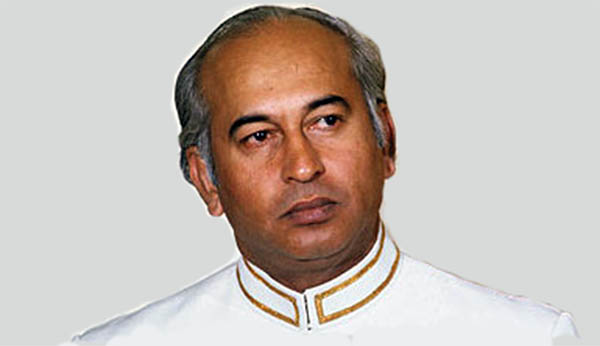

Zulfikar Ali Bhutto, who was born on 5th January 1928, came from a prominent Sindhi landowning family. His father, Sir Shah Nawaz Bhutto was the prime minister of Junagadh State, and enjoyed an influential relationship
Zulfikar Ali Bhutto
Zulfikar Ali Bhutto, who was born on 5th January 1928, came from a prominent Sindhi landowning family. His father, Sir Shah Nawaz Bhutto was the prime minister of Junagadh State, and enjoyed an influential relationship with the officials of the British Raj. As a young boy, Bhutto moved to Bombay (now Mumbai) to study at the Cathedral and John Connon School. During this period, he also became a student activist in the social movement and nationalist league, the Pakistan Movement.
In 1947, Bhutto was admitted to the University of Southern California to study political science. In 1949, Bhutto transferred to the University of California, Berkeley, where he earned a B.A. (honours) degree in Political science in 1950. Here, Bhutto would become interested in the theories of socialism, delivering a series of lectures on the feasibility of socialism in Islamic countries.
During this time, Bhutto's father, Sir Shahnawaz, played a controversial role in the affairs of the state of Junagadh (now in Gujarat). Coming to power in a palace coup as the dewan, he secured the accession of the state to Pakistan, which was ultimately negated by Indian intervention in December 1947.
In June 1950, Bhutto travelled to the United Kingdom to study law at Christ Church— a constituent college of the University of Oxford— and received an LLB, followed by another advanced LLM degree in Law and M.Sc. (honours) degree in Political science. Upon finishing his studies, he was called to the bar at Lincoln's Inn in the year 1953 (the same school at which Quaid-e-Azam Muhammad Ali Jinnah studied law).
Z. A. Bhutto married his wife, the Iranian-Kurdish Begum Nusrat Ispahani, in Karachi on 8 September 1951. Their first child, his daughter Benazir, was born in 1953. She was followed by Murtaza in 1954, a second daughter, Sanam, in 1957, and the youngest child, Shahnawaz Bhutto, in 1958. He accepted the post of lecturer at the Sindh Muslim College, from where he was also awarded an honorary doctorate in law by the then college President, Hassanally Rahman before establishing himself in a legal practice in Karachi. He also took over the management of his family's estate and business interests after his father's death.
Zulfikar Ali Bhutto entered national politics as one of President Iskander Mirza's cabinet members, before being assigned several ministries during President Ayub Khan's military rule from 1958. Appointed Foreign Minister in 1963, Bhutto was a proponent of Operation Gibraltar in Indian-occupied Kashmir, leading to war with India in 1965. After the Tashkent Agreement ended hostilities, Bhutto fell out with Ayub and was sacked from government.
He founded the PPP in 1967, contesting general elections held by President Yahya Khan in 1970. The Awami League in East Pakistan won a majority of seats, but neither Yahya nor Bhutto signalled yielding power. Subsequent uprisings led to the secession of Bangladesh, and Pakistan losing the war against Bangladesh-allied India in 1971. Bhutto was handed over the presidency in December 1971 and emergency rule was imposed.
By July 1972, Bhutto had recovered 93,000 prisoners of war and 5,000 square miles of Indian-held territory after signing the Simla Agreement. He strengthened ties with China and Saudi Arabia, recognised Bangladesh, and hosted the second Organisation of the Islamic Conference in Lahore in 1974. Domestically, Bhutto's reign saw parliament unanimously approve a new constitution in 1973, upon which he appointed Fazal Ilahi Chaudhry President and switched to the newly empowered office of Prime Minister.
He also played an integral role in initiating the country's atomic bomb project. However, Bhutto's nationalisation of much of Pakistan's fledgling industries, healthcare, and educational institutions led to economic stagnation. After dissolving provincial governments in Balochistan was met with unrest, Bhutto also ordered an military operation in the province in 1973, causing thousands of civilian casualties.
Despite civil disorder, aggravated by incidents of repression by Bhutto's Federal Security Force, the PPP won parliamentary elections in 1977 by a wide margin. However, the opposition alleged widespread vote rigging, and violence escalated across the country. On 5 July that same year, Bhutto was deposed by his appointed army chief General Zia-ul-Haq in a bloodless coup, before being controversially tried and executed by the Supreme Court of Pakistan in 1979 for authorising the murder of a political opponent.
While Bhutto remains a contentious figure in Pakistan's history, his party, the PPP, remains Pakistan's largest national political party, his son Murtaza Bhutto was an influential figure in the country's politics, his daughter Benazir Bhutto twice served as Prime Minister, and his son-in-law and Benazir's husband, Asif Ali Zardari served as the 11th President of Pakistan from 2008 to 2013.
Zulfiqar Ali Bhutto was buried in his ancestral village at Garhi Khuda Baksh, next to his father's grave.